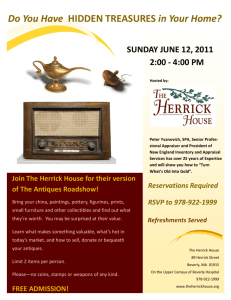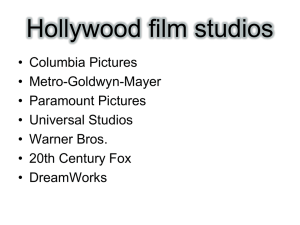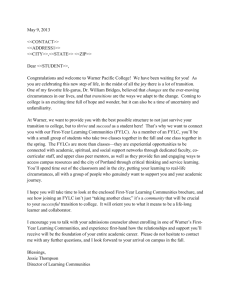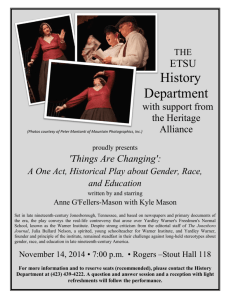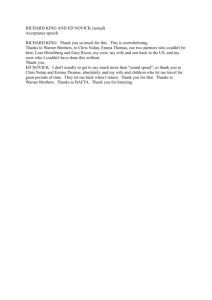Document 14385338
advertisement
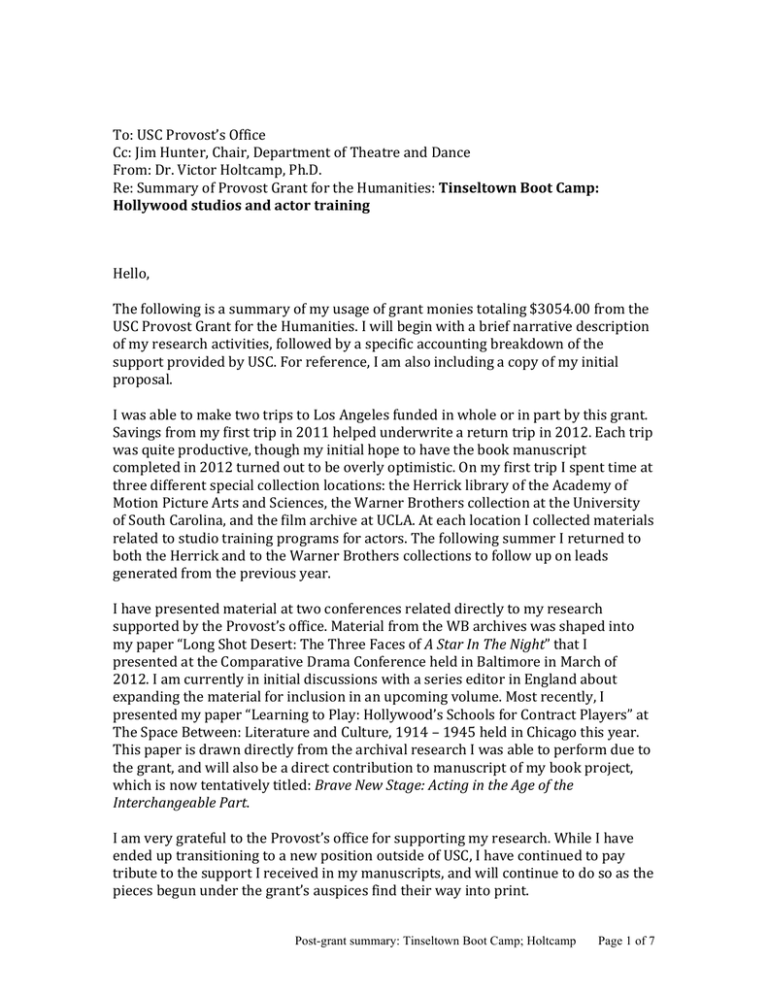
To: USC Provost’s Office Cc: Jim Hunter, Chair, Department of Theatre and Dance From: Dr. Victor Holtcamp, Ph.D. Re: Summary of Provost Grant for the Humanities: Tinseltown Boot Camp: Hollywood studios and actor training Hello, The following is a summary of my usage of grant monies totaling $3054.00 from the USC Provost Grant for the Humanities. I will begin with a brief narrative description of my research activities, followed by a specific accounting breakdown of the support provided by USC. For reference, I am also including a copy of my initial proposal. I was able to make two trips to Los Angeles funded in whole or in part by this grant. Savings from my first trip in 2011 helped underwrite a return trip in 2012. Each trip was quite productive, though my initial hope to have the book manuscript completed in 2012 turned out to be overly optimistic. On my first trip I spent time at three different special collection locations: the Herrick library of the Academy of Motion Picture Arts and Sciences, the Warner Brothers collection at the University of South Carolina, and the film archive at UCLA. At each location I collected materials related to studio training programs for actors. The following summer I returned to both the Herrick and to the Warner Brothers collections to follow up on leads generated from the previous year. I have presented material at two conferences related directly to my research supported by the Provost’s office. Material from the WB archives was shaped into my paper “Long Shot Desert: The Three Faces of A Star In The Night” that I presented at the Comparative Drama Conference held in Baltimore in March of 2012. I am currently in initial discussions with a series editor in England about expanding the material for inclusion in an upcoming volume. Most recently, I presented my paper “Learning to Play: Hollywood’s Schools for Contract Players” at The Space Between: Literature and Culture, 1914 – 1945 held in Chicago this year. This paper is drawn directly from the archival research I was able to perform due to the grant, and will also be a direct contribution to manuscript of my book project, which is now tentatively titled: Brave New Stage: Acting in the Age of the Interchangeable Part. I am very grateful to the Provost’s office for supporting my research. While I have ended up transitioning to a new position outside of USC, I have continued to pay tribute to the support I received in my manuscripts, and will continue to do so as the pieces begun under the grant’s auspices find their way into print. Post-grant summary: Tinseltown Boot Camp; Holtcamp Page 1 of 7 Thank you again for your support. If I can provide any additional details or information, please let me know. Sincerely, Dr. Victor Holtcamp, Ph.D. Assistant Professor, Department of Theatre and Dance 204 McWilliams Hall Tulane University New Orleans, LA 70118 504-­‐314-­‐7753 (office) vholtcamp@tulane.edu Post-grant summary: Tinseltown Boot Camp; Holtcamp Page 2 of 7 Victor Holtcamp: Provost Grant Budget Proposal Summer 2011 - Initial Trip Airfare (CLT – LAX) Rental car and gas Parking (~ $40 per day) Accommodations Per Diem Copies, Duplication, etc. Mileage Proposed Total: $355 $425 $400 $1,328 $346 $200 $334.30 $300.48 $50.00 $1,156.00 $368 $66.34 $93.00 $3,054.00 $2,368.12 Summer 2012 Additional Trip Flight (CLT – ONT – Ontario, California) Rental Car Parking Accommodations Per Diem Copies, Duplication, etc. $251.20 Total: Reimbursement requests 8/1/11 8/22/11 3/2/12 5/10/12 TOTAL Actual $2,301.78 $66.34 $251.20 $434.68 $3,054.00 Difference $20.70 $124.52 $350.00 $172.00 ($22.00) $133.66 $685.88 $434.68 $685.88 $0.00 2011: 79923 TA TA 20212: 91794 Post-grant summary: Tinseltown Boot Camp; Holtcamp Page 3 of 7 Initial Proposal Title: Tinseltown Boot Camp: Hollywood studios and actor training Total amount requested $3054 Principal Investigator Dr. Victor Holtcamp, Ph.D. Assistant Professor, Theatre and Dance College of Arts and Sciences Background: In the summer of 2010 I traveled to Los Angeles to survey two important collections of film history: the Margaret Herrick Library of the Academy of Motion Picture Arts and Sciences in Beverly Hills, and the Warner Brothers archives currently held at the University of Southern California. My goal was to initiate research on Hollywood studio actor training programs in support of an ongoing book project on the development of modern acting techniques in the United States. I had less than a week in the city to work with specialists at each location, and was able to identify many materials directly relating to my topic that are unavailable anywhere else. The collection at the Herrick is quite large, and in addition to the materials I processed while on location, there were a number of sources that I flagged for future follow-up. The Warner Brothers collection was initially less productive, but after my return to South Carolina I received a message from one of the archivists that they had uncovered files with 100+ pages of material relating to acting coaches employed by Warner Brothers. I am seeking this grant to return to Los Angeles and continue my research at both archives. Narrative of the Project: My objectives for this trip are straightforward: I will spend time in each collection researching approaches to actor training by Hollywood studios in the early and mid 20th century. I am seeking evidence of the methodology and philosophy that the studios and their agents employed regarding acting and actor training. This research will support both a journal article specifically focused on the archival work, and a book on approaches to actor training. The materials at the Herrick include “house organs” (company newsletters for the major studios), a variety of oral history resources – including the SMU collection of Ronald L. Davis, which has very strict accession rules – contemporaneous film periodicals and an enormous collection of manuscripts, files, and papers from the major Hollywood studios. The Warner Brothers papers are archived at the University of Southern California, and contain records from 1918 – 1968 encompassing all the activities of the studio. Each of these archives contains rare and completely unique material, unavailable anywhere else. Access to these archives is critical in filling in the story of how major Hollywood studios trained their actors, and how the concept of acting changed in this period. In most histories of Hollywood the training of actors under contract is mentioned, but rarely pursued in depth. In most histories of acting, Hollywood training is often ignored. Partly this is a reflection of the feeling that many actors received their training on stage before coming to Los Angeles. A further reason for the relative dearth of coverage is the vested interest the studios had in presenting the image of a “star” to the public as a finished product. Seeing how a star was made was considered something best kept hidden from view (like sausages, perhaps), and for those who did not achieve stardom, their stories were rarely told. Yet studios invested significant time, money, and energy into “training” all manner of performers in a variety of skills and techniques, ranging from tap dancing to dramatic performance. In-house Post-grant summary: Tinseltown Boot Camp; Holtcamp Page 4 of 7 training was a fact of life for thousands of actors placed under contract by major studios, and a story worthy of being told. This work will directly influence and support my current book project on the changing nature of actor training in the 20th century. Specifically, I examine how cultural changes provoked by the increasing ubiquity of mass production techniques influenced how people approached the nature of actors and acting. Hollywood in many ways represents the apotheosis of my investigation. The studio system developed as it did precisely because the method of making films is so mechanized, and everything the studios did was calculated to generate maximum efficiency in producing the product. In this sense, the studios were consciously modeled after Ford’s car factories. Actors under contract were put onto an assembly line of sorts, designed to make them versatile enough players that they could be consistently used in a variety of film genres. This direct connection to the world of industrialization will deepen and enrich the arguments and analysis I offer in regards to the changing conception of what it meant to be an actor, and how someone became one, in the 20th century. My proposed timeline is to spend a week and a half in LA, spending the bulk of my time at the Herrick collection, but also reviewing the recent finds in the Warner Brothers papers. The Herrick is open Monday, Tuesday, Thursday and Friday. The Warner Brother’s papers are available Mon-Fri. Neither collection has weekend hours. For this reason I plan to travel to LA on a Sunday and stay for 10 days, giving me eight days of research time. While some of the material is available for copying/scanning, many of the collections have limits on what can be mechanically duplicated, necessitating hand transcription of the relevant materials. Further, the Warner Brothers papers have limited indexing, and in my experience tracking down references and cross-references can be time consuming. Despite these challenges, I believe that the eight research days will allow me sufficient time to pursue any additional leads that may develop from either collection and to continue my review of the previously identified sources. I am confident that the level of archival research that I will perform, coupled with my previous work, will allow me to generate a stand-alone article, as well as provide critical information leading to the completion of my current book project. I anticipate the article to be ready for submission by the end of 2011, and the book to be ready in 2012. This will naturally support my research agenda as I work towards tenure, and provide visibility for USC through the publication and dissemination of the research I perform. Budget Proposal Airfare (CLT – LAX) Rental Car Parking Accommodations Per Diem Copies, Duplication, etc. $355 $425 $400 $1328 $346 $200 Total: $3,054.00 Post-grant summary: Tinseltown Boot Camp; Holtcamp Page 5 of 7 Biography I received dual degrees in history and drama at the University of Washington, graduating cum laude. I earned my MA degree in theatre from Brown University in 2000, and returned the UW for my doctorate, successfully defending my dissertation in 2003. Prior to being hired by USC I worked for three years at Group Health Cooperative, a non-profit health care system based in Seattle, WA. Initially I was hired as an educational consultant, and was subsequently promoted to project manager, and then project director. I came to the University of South Carolina as a visiting assistant professor in 2007, and was hired as a tenure-track assistant professor in 2008. I have recently submitted my third-year review portfolio to our department T&P committee. Key Scholarship, Accomplishments, Contributions • • • Magellan Scholars Mentor – Jeni Miller, 2010 Development Dramaturg – Medicine Showdown, Flying Carpet Theatre (NYC), 2009 “A Fear of ‘Ould’ Plays: How Mucedorus Brought Down the House and Fought for Charles II in 1652”, in The Shakespeare Apocrypha. A publication of the Shakespeare Yearbook, v. 16, 2005. Douglas A. Brooks, John Ford, and Ann Thompson eds. Lewiston, N.Y.: Edwin Mellen Press, 2007. Bibliography More information about each collection can be found by visiting their respective websites: • The Margaret Herrick Library of the Motion Picture Academy of Arts and Sciences http://www.oscars.org/library/ • The Warner Brothers Archives at the University of Southern California http://www.usc.edu/libraries/collections/warner_bros/ Budget Justification Airfare: $355: Flying from Charlotte to LAX is cheaper than flying out of Columbia. This price was quoted on priceline.com for June 19 – June 30, 2011. Car Rental: $425: Current price quotes for June 19 – 30, 2011 run ~ $390. Added approximate price of fuel to reach total price. Parking: $400: Parking in LA, whether at a hotel or an off-site garage, runs ~$30 per 24 hour period. Parking at each archive runs between $5 and $15 depending on length of parking and spaces available. Public transport (bus, subway) is not an efficient option for these LA locations at this time. Post-grant summary: Tinseltown Boot Camp; Holtcamp Page 6 of 7 Accommodations: $1328: Via on-line discount hotel site, received quote for $1328 during the month of June 2011. (June 19 – June 30, 2011; $109 per night plus taxes and fees.) I was able to secure a similar rate this past summer, and given some flexibility in travel dates should be able to meet this price in the future. Per Diem: Based on published USC per diem rates for 10 days out of state travel, plus travel time. Copies, Duplication: Some archival materials allow for duplication or scanning. Copies made of Herrick Special Collection materials are copied off-site and mailed back to the researcher. This line item covers duplication and mailing costs for both archival locations. CURRENT AND PENDING SUPPORT FORM The following information must be provided for each investigator and other senior personnel. Failure to provide this information may delay consideration of this proposal. Other agencies to which this proposal has been/will be submitted: Investigator: Dr. Victor Holtcamp Support: Current X N/A Pending Submission Planned in Near Future Project/Proposal Title: The Rediscovery of North America Project Source of Support: Department grant for artistic achievement Total Award Amount: $3200 Total Award Period Covered: Spring 2011 Location of Project: Columbia Months of Your Time Committed to the Project: 4 months FY: 2010- 11 Summer: N/A *If this project has previously been funded by another entity, please list and furnish information for immediately preceding funding period. N/A Post-grant summary: Tinseltown Boot Camp; Holtcamp Page 7 of 7
